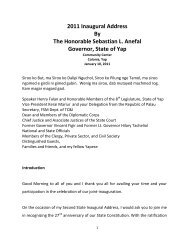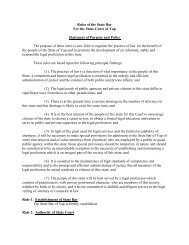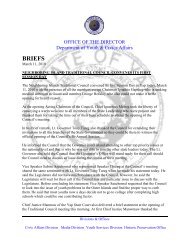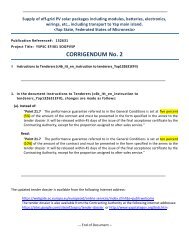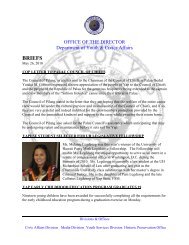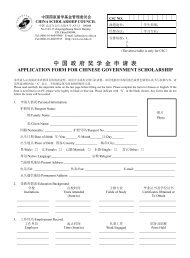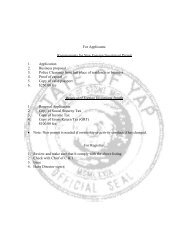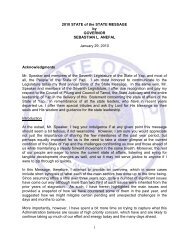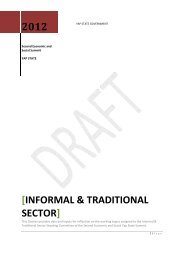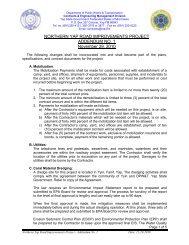RULES OF CIVIL PROCEDURE For the Trial Division of the Yap ...
RULES OF CIVIL PROCEDURE For the Trial Division of the Yap ...
RULES OF CIVIL PROCEDURE For the Trial Division of the Yap ...
You also want an ePaper? Increase the reach of your titles
YUMPU automatically turns print PDFs into web optimized ePapers that Google loves.
Rule 14. Third-Party Practice.<br />
(a) When Defendant May Bring in Third Party. At any time after commencement <strong>of</strong><br />
<strong>the</strong> action a defending party, as a third-party plaintiff, may cause a summons and<br />
complaint to be served upon a person not a party to <strong>the</strong> action who is or may be liable to<br />
him for all or part <strong>of</strong> <strong>the</strong> plaintiff's claim against him. The third-party plaintiff must, by<br />
motion, obtain <strong>the</strong> court's leave if it files <strong>the</strong> third-party complaint more than 10 days<br />
after serving its original answer. The third party defendant, <strong>the</strong> person served with <strong>the</strong><br />
summons and third-party complaint, shall make his defenses to <strong>the</strong> third-party plaintiff's<br />
claim as provided in Rule 12 and his counterclaims against <strong>the</strong> third-party plaintiff and<br />
crossclaims against o<strong>the</strong>r third-party defendants as provided in Rule 13. The third-party<br />
defendant may assert against <strong>the</strong> plaintiff any defenses which <strong>the</strong> third-party plaintiff has<br />
to <strong>the</strong> plaintiff's claim. The third-party defendant may also assert any claim against <strong>the</strong><br />
plaintiff arising out <strong>of</strong> <strong>the</strong> transaction or occurrence that is <strong>the</strong> subject matter <strong>of</strong> <strong>the</strong><br />
plaintiff's claim against <strong>the</strong> third-party plaintiff. The plaintiff may assert any claim<br />
against, <strong>the</strong> third party defendant arising out <strong>of</strong> <strong>the</strong> transaction or occurrence that is <strong>the</strong><br />
subject matter <strong>of</strong> <strong>the</strong> plaintiff's claim against <strong>the</strong> third-party plaintiff, and <strong>the</strong> third-party<br />
defendant <strong>the</strong>reupon shall assert his defenses as provided in Rule 12 and his<br />
counterclaims and cross-claims as provided in Rule 13. Any party may move to strike <strong>the</strong><br />
third-party claim, or for its severance or separate trial. A third-party defendant may<br />
proceed under this rule against any person not a party to <strong>the</strong> action who is or may be<br />
liable to him for all or part <strong>of</strong> <strong>the</strong> claim made in <strong>the</strong> action against <strong>the</strong> third-party<br />
defendant<br />
(b) When Plaintiff May Bring in Third Party. When a counterclaim is asserted<br />
against a plaintiff, he may cause a third party to be brought in under circumstances which<br />
under this rule would entitle a defendant to do so.<br />
Comment: This rule follows Federal Rule 14. It differs in one aspect from <strong>the</strong><br />
Trust Territory rule: leave <strong>of</strong> <strong>the</strong> court is not required in this rule as required under <strong>the</strong><br />
Trust Territory rule. Subdivision (c) and references to admiralty and maritime claims in<br />
subdivision (a) are deleted since admiralty and maritime claims will not be within <strong>the</strong><br />
jurisdiction <strong>of</strong> <strong>the</strong> State Court <strong>of</strong> <strong>Yap</strong>.<br />
Rule 14(a) has been changed to ease comprehension. No substantive changes are<br />
intended.<br />
Rule 15. Amended and Supplemental Pleadings.<br />
(a) Amendments Before <strong>Trial</strong>.<br />
(1) Amending as a Matter <strong>of</strong> Course.<br />
A party may amend its pleading once as a matter <strong>of</strong> course within:<br />
(A) 30 days after serving it, or



